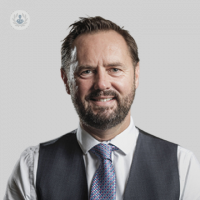ACL rupture surgery: What to expect and when to return to sports
Written in association with:Suffering an ACL rupture can be concerning, but it's important to remember that ACL reconstruction surgery is not always an immediate necessity. The decision to undergo ACL surgery is highly individualised and depends on various factors, all of which will be thoroughly discussed during your consultation. In his latest online article, Mr Alexander Anderson sheds light on the possible considerations surrounding ACL surgery, the rehabilitation process, potential complications, and the timeline for returning to sports.

Is surgery necessary?
The need for ACL reconstruction surgery should be carefully evaluated based on your unique circumstances. While not all ACL ruptures require surgery, several factors come into play when making this decision. These include the extent of structural damage to the knee, your expectations, and the nature of your daily activities. In some cases, an MRI scan may aid in the decision-making process, although experienced surgeons can often diagnose ACL ruptures without one.
When is conservative treatment recommended?
Approximately 30% of individuals with an isolated ACL rupture can successfully return to their usual activities, including some sports, through conservative treatment. This typically involves a tailored physiotherapy program and, on occasion, the use of an ACL knee brace for specific activities. However, competitive sports that involve pivoting movements, such as football and rugby, pose a higher risk without surgery, potentially leading to further knee damage, including a 40% chance of meniscal tears within two years.
When is an ACL reconstruction necessary?
ACL reconstruction is often necessary because the ligament does not heal naturally. Commonly, a hamstring tendon graft is used, harvested from the same injured side, and reattached to the knee through minimally invasive keyhole surgery. The graft is secured using screws and suspensory fixation. Other graft options, such as the patella tendon, may also be discussed if deemed suitable. Additionally, any other damaged structures in the knee can be addressed during the same procedure.
Recovery timeline:
Patients are encouraged to start moving their knee as soon as possible to reduce the risk of complications like deep vein thrombosis (DVT). In some cases, a knee brace may be advised initially, but most patients can fully weight bear right away. Stitches are not typically used, and a tubigrip bandage is applied over the dressings. Crutches are provided for support but are usually discarded between 2 and 4 weeks post-surgery. Driving is possible after 4 weeks (sooner for the left knee and automatic cars). Full recovery, including returning to non-manual work, may take around 6 weeks, with light duties possibly necessary for up to 3 months. Avoid long-haul flights for 6 weeks due to thrombosis risk.

Are there any potential complications?
While complications are rare, they can occur. These may include re-rupture of the graft (5-7% risk), DVT (<1%), infection (<1%), stiffness and discomfort (2-3%), sensory skin changes (10-15%), bleeding (usually not concerning), and hamstring "pop" (temporary setback in rehab).
While there isn't substantial published evidence supporting the idea that an ACL reconstruction can definitively postpone the onset of potential osteoarthritis, it is established that approximately 85-90% of patients regain their pre-injury level of activity and function after undergoing surgery. Common sense suggests that having a stable knee for these activities significantly reduces the risk of further injury and repeated damage.
When can I return to pivoting sports?
Returning to pivoting sports is a gradual process. Non-competitive play or training is allowed at 6 months, while competitive sports should be delayed until 9-12 months post-surgery. Non-pivoting sports like cycling may be resumed from 3 months onward. Follow a comprehensive rehabilitation program, and consider the Prevent Injury and Enhance Performance (PEP) program to support your safe return to sports.
ACL rupture treatment and surgery are highly individualised decisions. Understanding the factors involved, the surgery process and the rehabilitation timeline can help you make an informed choice about your ACL injury management. Always consult with your healthcare provider for personalised guidance and recommendations.
If you would like to book a consultation with Mr Alexander Anderson, you can do so today via his Top Doctors profile.


